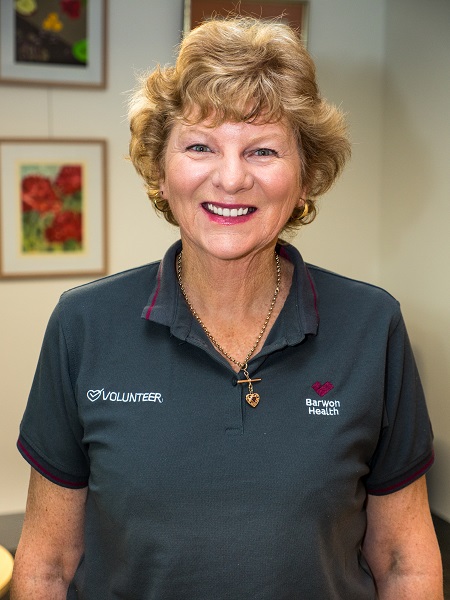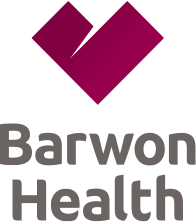World Head and Neck Cancer Day – 27 July 2017
It’s an aggressive cancer that carries a heavy social burden. But when discovered early, it’s one of the most treatable cancers a person can be diagnosed with.
Head and neck cancer is a general term used to refer to a range of different cancers that start developing in the head and neck region of the body. This includes the oral cavity, the tongue, palate, jaw, salivary glands, the throat and the nose.
According to the Cancer Council, about 4,000 people in Australia are diagnosed with head and neck cancer each year and last year, Barwon Health treated more than 200 people for head and neck cancer.
While alcohol and smoking are the biggest risk factors for head and neck cancers (with the exception of salivary gland cancer), some head and neck cancers are related to human papilloma virus infection.
Like all cancers, the tragedy is it can affect anyone as Grovedale grandmother Glenda Ford found out, when she was diagnosed with throat cancer eight years ago.
At 55, Glenda was a fit and healthy marketing consultant relishing in the joys of becoming a grandmother for the first time.
It was the discovery of a small, painless lump in her throat that changed Glenda’s life.
“Eighteen days after surgery to remove the lump I had a massive bleed requiring hospitalisation to cauterise it. As I was going under, I was told I might not live through the operation but thankfully I did,” Glenda said.
“I had 35 rounds of radiation therapy simultaneously with chemotherapy over seven weeks. After the tonsil was removed, I had a PEG tube inserted into my stomach to allow me to have a high protein liquid food. It remained there for eight months. During this period I was unable to eat solid foods for most of that time.”
It wasn’t just the devastating diagnosis of cancer that Glenda and her husband Geoff had to cope with, it was also a social stigma associated with having a head and neck cancer.
“People assume that if you have a head and neck cancer, you have been a heavy drinker and smoker. But not all people who have a head and neck cancer have been drinkers or smokers including myself. Without using the exact words, some people considered me and others with this type of cancer to have lived a ‘dirty’ life,” Glenda explained.
Now in remission, Glenda is a volunteer at Barwon Health’s Supportive Care Centre, a place where she connects with people going through similar experiences in a non-clinical way. Glenda hosts morning tea twice a month in the centre and up to 30 patients and their family members attend to support one another.
“This cancer is less well-known and it can happen to anyone – it is a terrible cancer that causes so much trauma with a long road to recovery,” she said.
“I made a conscious decision to remember as much as could about my experience so that I could help others going through similar experiences.
“Many people supported me during and after my illness. Family, friends and members of groups that I have been involved with have helped to fundraise. The funds raised have been used to create bags of the essential things people need when they begin their treatment journey. We have been able to provide these bags to Barwon Health to hand out to newly diagnosed patients for the last five years.”
World Head and Neck Cancer Awareness Day is on Thursday, 27 July and Barwon Health is hosting a free morning tea and information session at 10am in the Supportive Care Centre at University Hospital Geelong, where people can hear from and speak with Glenda and radiation oncologist Dr Maitham Mathlum.
Dr Mathlum, who specialises in the treatment of head and neck cancer, said that although head and neck cancers were some of the most complex, they were very responsive to treatment.
“Early detection plays a big part in prognosis and educating the community and GPs about symptoms and signs of the disease is important,” Dr Mathlum said.
“Symptoms depend on the site, however a person may experience one or more symptoms of pain, swelling, hoarse voice and difficulty swallowing.
“Prevention is the first step to beating the disease and getting better outcomes for the future. People with a higher risk of developing this cancer reduce their chances; quit smoking now, avoid secondary smoke and reduce alcohol consumption.
“If a person has symptoms or concerns, they should consult with a GP.”
At 63, Glenda’s treatment and recovery is ongoing but she hasn’t let it get in the way of living life to the fullest.
“I still have health issues that require monitoring and treatment but I have learnt to live around these limitations. I have a wonderful quality of life – I am living and enjoying my life with friends and family and doing volunteer work.”
Media contact – ph. (03) 4215 1119 [email protected]
Media Contacts
The Public Affairs and Communications Department manages all media relations at Barwon Health.
For all media enquiries, please contact the Public Affairs and Communications department.
Phone: 03 4215 1119, Monday to Friday: 8.30am to 5pm
Email: [email protected]
For urgent, after hours/weekend media enquiries, this number diverts to the 'on-call' staff member.
